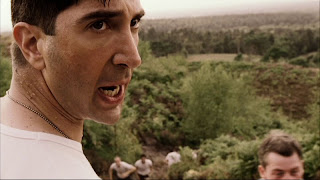
"BAND OF BROTHERS" (2001) - EPISODE ONE “CURRAHEE” COMMENTARY
After spending the last six months or so watching and re-watching my taped copies of the recent HBO miniseries, ”THE PACIFIC”, my family and I decided to re-watch the first television collaboration between Tom Hanks and Steven Spielberg. Of course I am speaking of the 2001 Golden Globe and Emmy winning miniseries, ”BAND OF BROTHERS”.
Based upon Stephen Ambrose historical book , ”BAND OF BROTHERS” centered around the experiences of “Easy” Company, one company of the 506th Parachute Infantry Regiment, assigned to the 101st Airborne Division during World War II. The miniseries was divided into ten episodes and starred Damian Lewis and Ron Livingston. The first episode, titled ”Curahee”, told the story of Easy Company’s two years of training at Toccoa, Georgia; North Carolina; and later in England under the command of Herbert Sobel.
”Currahee” basically served as an introduction of the main characters featured throughout the miniseries. However, not all of the characters made an impact in this episode. Albert Blythe, David Webster and several others were occasionally seen, but not heard. But one did have characters like William “Wild Bill” Guarnere, Carwood Lipton, George Luz, John Martin, Joe Liebgott, and Harry Welsh certainly made their impacts. More importantly, the two lead characters were featured – namely Richard Winters and Lewis Nixon. But I might as well be frank. This episode truly belonged to the man who had served as Easy Company’s first commander, Herbert Sobel.
The acting in ”Currahee” struck me as pretty solid. At least 70% of the cast featured British or Irish actors portraying American servicemen. Some of the actors did pretty good jobs in maintaining an American accent – including Damian Lewis. However, there were times when it seemed that the basic American accents that most of the British cast seemed capable of using were either Southern, a flat trans-Atlantic accent or an accent from one of the five boroughs of New York City. I found it disconcerting to find some British actors using the latter, despite their characters coming from another part of the country. For example, actor Ross McCall did a great New York accent. Unfortunately, his character Joe Liebgott was born in Michigan, and moved to San Francisco sometime before the war. Even some of the American actors used the wrong accent for their characters. I enjoyed James Madio’s performance as Frank Perconte. However, Madio, who hailed from New York City (the Bronx), used his natural accent to portray Illinois native, Perconte.
I have to be honest. I never found the basic training sequences featured in some war movies to be interesting. In fact, the only war movies that featured interesting training sequences were about the Vietnam War - ”THE BOYS OF COMPANY ‘C’” (1978) and ”FULL METAL JACKET” (1987). As I had stated earlier, the episode ”Currahee” truly belonged to the Herbert Sobel character and David Schwimmer’s memorable and complex performance. Despite Ambrose’s portrayal of Sobel as a tyrannical company commander that was deeply disliked by his men, many veterans of Easy Company cannot deny that he made the company. His tough training methods helped the men endure the horrors of war that faced them in future battles. If it were not for his character and Schwimmer’s performance, I would barely consider ”Currahee” as an interesting episode.
Once Sobel was removed from the scene, the last 15 to 20 minutes of ”Currahee” featured Easy Company’s preparation for their jump into Normandy, France and their participation of the famous June 5-6 invasion. Those last minutes also set future storylines in the next episode and in future ones – including Easy Company’s experiences in France, Guarnere’s anger over his brother’s death, and Lynn “Buck” Compton’s relationship with the men in his platoon. It was not a bad episode. In fact, it was pretty interesting, thanks to David Schwimmer’s portrayal of Easy Company’s first commander, Herbert Sobel. But if it were not for the presence of Sobel’s character, I would almost find this episode rather dull.





